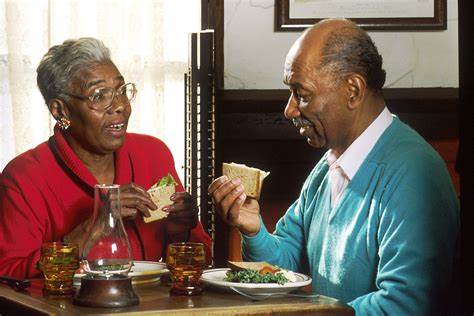
If you’ve lost several or all of your teeth, dentures may be a suitable solution for restoring your smile. As a popular option for nearly 15% of individuals who experience total tooth loss, dentures provide a dependable way to regain both function and confidence in your smile. However, getting used to eating with dentures can be a bit challenging at first. To help you adapt more comfortably and make the transition smoother, here are four practical tips to help you adjust to your new dentures.
Tip #1: Take It Slow
When you start eating with dentures, ease into it to make the adjustment more comfortable. Chew evenly on both sides of your mouth, and focus on soft foods that are gentle on your gums. To help you get used to your dentures, consider these examples of soft, easy-to-chew foods:
- Mashed potatoes
- Scrambled eggs
- Gelatin, pudding, or low-fat yogurt
- Applesauce and other cooked or pureed fruits and veggies
- Smooth soups that won’t burn your mouth
- Smoothies, milkshakes, and juices
- Cooked cereals, like oatmeal and porridge
Tip #2: Practice Makes Perfect
As you get used to your dentures, slowly add firmer foods to your diet. Begin with small portions and cut your food into bite-sized pieces to make chewing easier. Practice eating these foods at home to gain confidence before eating out. Be sure to chew evenly on both sides of your mouth and avoid very hot foods or anything with sharp bones or shells.
Tip #3: Bite with Care
When eating, use your canines rather than your front teeth to bite into food. Biting with your front teeth can cause your dentures to shift, which may lead to discomfort and sore gums.
Tip #4: Foods to Avoid
Once you’ve fully adapted to eating with dentures, most foods should be manageable. However, you might still find some types of food challenging to eat, such as:
- Crusty breads and crackers
- Chewing gum and sticky candies
- Fruits and vegetables, like apples, carrots, and corn on the cob
- Crunchy peanut butter
- Popcorn and whole nuts
- Tough or stringy meats such as brisket
Adjusting to eating with dentures requires patience, but over time, you’ll likely find it easier to enjoy most foods. If you’re still having trouble, it’s a good idea to see your dentist. They can assess the fit of your dentures and provide tips to help make eating more comfortable.
About the Practice
Sehnert Precision Dentistry is committed to providing exceptional dental care to New York City and nearby communities. Prioritizing patient comfort and a caring approach, they aim to make every dental visit a stress-free experience. Their team offers a wide array of services for patients of all ages, ensuring your dental needs are addressed with top-notch care and respect. To learn more about their denture options or to schedule an appointment, contact Sehnert Precision Dentistry at (972) 420-0042 or visit their website.
